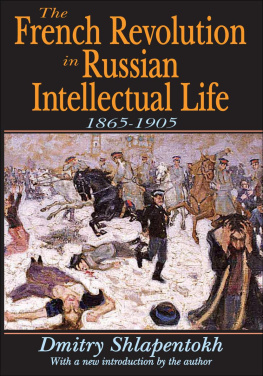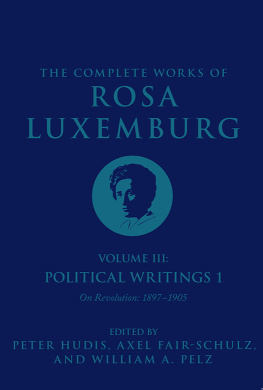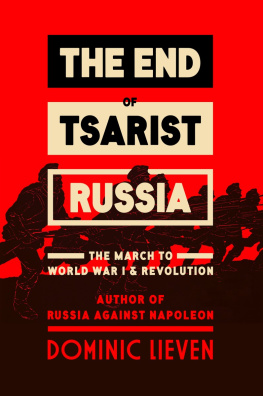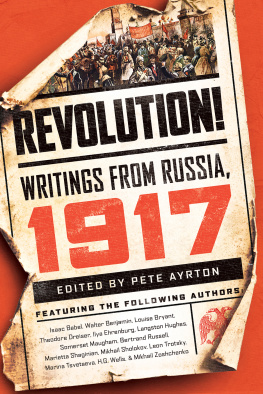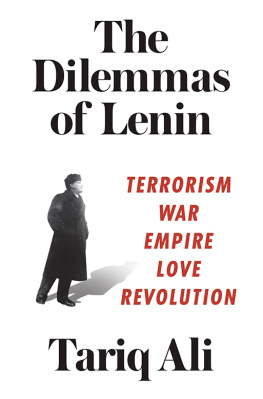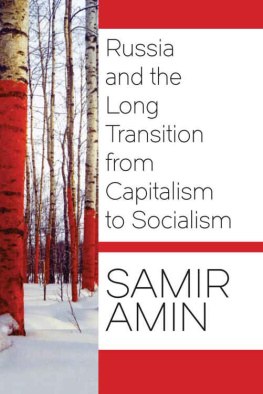Acknowledgements
This volume is derived from some of the papers delivered at the XXXth Annual Conference of the Study Group on the Russian Revolution (SGRR), which took place at Nottingham on 35 January 2004, with the financial support of the British Academy, BASEES and the Institute for Russian, Soviet and Central and East European Studies, University of Nottingham.
Information regarding membership of the SGRR and its future conferences can be obtained from the groups website: http://www.basees.org.uk/sgrusrev.htm.
The SGRRs journal, Revolutionary Russia , has been published biannually since 1988. For general editorial matters, including the submission of articles, contact the editor (at the time of writing: Dr Jonathan D. Smele, Department of History, Queen Mary, University of London, London E1 4NS). Regarding subscriptions and the contents of past issues, see the publishers website: http://www.tandf.co.uk/journals/.
Contributors
Oleg Airapetov , a specialist in Russian foreign policy and the countrys military history of the late nineteenth and early twentieth centuries, is Senior Lecturer in the Department of History at Moscow State University. He is currently working on a study of the Imperial General Staff in the First World War. His publications include Zabytaia kar era russkogo Mol tke: Nikolai Nikolaevich Obruchev (18301904) (St Petersburg, 1998); Generaly, liberaly i predprinimateli: rabota na front i na revoliutsiiu (19081917) (Moscow, 2003); the edited collections Poslednaia voina Imperatorskoi Rossii (Moscow, 2002); and Russko-Iaponskaia voina 19041905gg.: vzgliad cherez stoletie (Moscow, 2004).
Abraham Ascher , Distinguished Professor Emeritus of History at the Graduate Center of the City University of New York, is the author of Pavel Axelrod and the Development of Menshevism (Cambridge, Mass., 1972); The Revolution of 1905 , 2 vols (Stanford, 198892); P. A. Stolypin: The Search for Stability in Late Imperial Russia (Stanford, 2001); Russia: A Short History (Oxford, 2002); and The Revolution of 1905: A Short History (Stanford, 2004); he is also the editor of The Mensheviks in the Russian Revolution (Ithaca, N.Y., 1976) and Studying Russian and Soviet History (Boulder, 1987).
Shmuel Galai is Professor Emeritus of Ben-Gurion University of the Negev, Israel. His contribution to this collection forms part of his current project, a study of the Kadet Party from its inception to the Bolshevik seizure of power in October 1917. His book on The Liberation Movement in Russia, 19001905 (London, 1973) was reissued in paperback by Cambridge University Press in 2002.
Anna Geifman , Professor of History at Boston University, is the author of Thou Shalt Kill: Revolutionary Terrorism in Russia, 18941917 (Princeton, 1993) and Entangled in Terror: The Azef Affair and the Russian Revolution (Wilmington, 2000); she is also the editor of Russia under the Last Tsar: Opposition and Subversion, 18941917 (Oxford, 1999). She has published many articles on Russian political and cultural history and is currently working on a volume of psychohistorical essays on political extremism.
Michael F. Hamm is Ewing T. Boles Professor of History at Centre College, where he teaches courses on Russia, the Soviet Union, modern Europe and the Middle East. He is the author of Kiev: A Portrait, 18001917 (Princeton, 1993); and editor and part-author of The City in Russian History (Lexington, Ky., 1976) and The City in Late Imperial Russia (Bloomington, 1986), as well as the author of scholarly articles on Kyiv, Kharkiv, Riga and Kishinev.
Anthony Heywood is Senior Lecturer in History at the University of Bradford. His publications include Modernising Lenins Russia: Economic Reconstruction, Foreign Trade and the Railways (Cambridge, 1999) and his biography of the eminent Russian transport engineer Iurii Vladimirovich Lomonosov is forthcoming as Engineer of Revolutionary Russia (Aldershot, 2006).
Antti Kujala is Senior Lecturer in Finnish and Russian History at the University of Helsinki. In addition to the books mentioned in the notes to his chapter in this book, his major publications include The Crown, the Nobility and the Peasants 16301713: Tax, Rent and Relations of Power (Helsinki, 2003) and Miekka ei laske leikki: Suomi suuressa pohjan sodassa, 17001714 (Helsinki, 2001).
Christian Noack is Assistant Professor of East European History at Bielefeld University. His main fields of research are nationality questions in Eastern Europe, the Russian Empire and the Soviet Union and, currently, the history of travel and tourism in the USSR. His publications include Muslimischer Nationalismus. Nationsbildung und Nationalbewegung bei Tataren und Baschkiren, 18611917 (Stuttgart, 2000).
Christopher Read is Professor of History at the University of Warwick. His publications include The Stalin Years: A Reader (Basingstoke, 2003); The Making and Breaking of the Soviet System (Basingstoke, 2001); and From Tsar to Soviets: The Russian People and Their Revolution, 19171921 (London, 1996). His latest book is Lenin: A Revolutionary Life (London, 2005).
David Saunders is Professor of the History of the Russian Empire at the University of Newcastle upon Tyne. His publications include The Ukrainian Impact on Russian Culture, 17501850 (Edmonton, 1985); Russia in the Age of Reaction and Reform 18011881 (London, 1992); and about thirty academic articles.
Franziska Schedewie submitted her Ph.D. thesis, entitled Selbstverwaltung und sozialer Wandel in der russischen Provinz. Bauern und Zemstvo in Vorone, 18641914, at the University of Heidelberg in 2004. She is currently working at the University of Jena on a research project on Russian foreign policies under Alexander I and the relations between Russia and Weimar.
Ian D. Thatcher is Reader in Modern European History at Brunel University and the author of numerous academic articles and books, including Leon Trotsky and World War One, August 1914February 1917 (Basingstoke, 2000) and Trotsky (London, 2003). He also edited Alec Nove on Economic Theory: Previously Unpublished Writings , 2 vols (Northampton, Mass., 1998) and Regime and Society in Twentieth-Century Russia (Basingstoke, 1999).
James D. White is Professor of Russian and East European Studies and Head of the School of Slavonic, Central and East European Studies at the University of Glasgow. His publications include The Russian Revolution, 19171921: A Short History (London, 1994); Karl Marx and the Intellectual Origins of Dialectical Materialism (Basingstoke, 1996); and Lenin: The Practice and Theory of Revolution (Basingstoke, 2001).
Beryl Williams is Emeritus Reader in History at the University of Sussex. She is the author of The Russian Revolution, 19171921 (Oxford, 1987; reissued and updated 1995) and Lenin (London, 2000), as well as numerous academic articles.
1 Introduction
Abraham Ascher
As the title of this volume on the Russian Revolution of 1905 suggests, the book is intended to provide readers with new perspectives on what is generally considered to have been one of the critical junctures in modern Russian history and, in many ways, in the history of the twentieth century, aptly termed the age of extremes. Initially prepared as papers for the XXXth Annual Conference of the Study Group on the Russian Revolution (at Nottingham, United Kingdom, on 35 January 2004), all the contributions except one were extensively discussed by a group of some forty scholars and then revised to take into account various criticisms and suggestions. The result, in my view, is a collection of highly interesting and stimulating chapters that shed light on an event that is still insufficiently understood.


